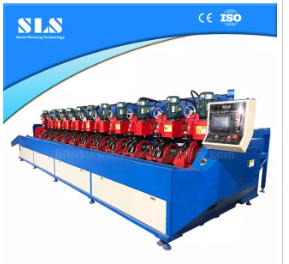Exploring the Features of a Boiler Pipe Bending Machine
Boiler pipe bending machines are pivotal in various industries for bending thick-walled pipes used in boilers and heat exchangers. This article explores the key features and specifications of these machines, shedding light on how they enhance operational efficiency and product quality.
Essential Components and Their Functions
Power Source
A boiler pipe bending machine harnesses electric power to deliver precise bends. These machines typically operate with a power capacity ranging from 10 kW to 50 kW, which directly affects their ability to handle larger diameters and thicker pipe walls.
Mandrel and Clamp System
The mandrel is a robust component that supports the pipe internally during the bending process to prevent collapse or wrinkling. The clamp system holds the pipe in place, ensuring it does not slip or misalign during bending. These components are critical for maintaining high-quality bends, especially in rigid materials.
Bending Capacity and Range
Boiler pipe bending machines can accommodate a wide range of pipe diameters, from small 2-inch pipes up to large 5-inch pipes. The bending capacity is crucial for selecting a machine that fits the specific needs of a project or production line.
Control Technology
Modern machines incorporate advanced control technology, such as CNC (Computer Numerical Control), to automate the bending process. Operators can input precise specifications, including bend angles and rotations, ensuring high repeatability and minimal human error.
Performance Metrics and Specifications
Efficiency and Production Speed
These machines significantly reduce the time required to bend pipes, with typical speeds up to 3 meters per minute. This increase in speed translates to higher throughput and reduced project timelines, making the machine a valuable asset in production environments.
Cost Considerations
The purchase price for boiler pipe bending machines generally falls between $50,000 and $200,000. The substantial investment reflects the machine's capability and the technological sophistication it brings to pipe bending operations.
Operational Life and Quality Assurance
Boiler pipe bending machines are built to last, with an operational life expectancy of around 40,000 hours under typical use conditions. Regular maintenance can extend this lifespan further, securing a high return on investment over many years.
Machine Dimensions and Weight
The physical footprint of a boiler pipe bending machine varies, but a typical machine might measure about 4 meters in length and 2 meters in width, weighing approximately 5000 kilograms. These dimensions are vital for planning the installation and operational space in a facility.
Advantages and Material Adaptability
These machines are highly adaptable, handling various materials like carbon steel, stainless steel, and alloy materials, which are commonly used in boiler applications. The main advantage of using these machines is their ability to produce consistent, precise bends, which are essential for maintaining the integrity and functionality of boiler systems.
In summary, boiler pipe bending machines are sophisticated pieces of equipment designed to meet the rigorous demands of modern industrial applications. They offer precision, efficiency, and reliability, making them indispensable for companies looking to streamline their manufacturing processes and improve product quality.
